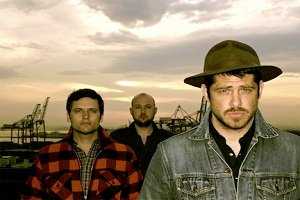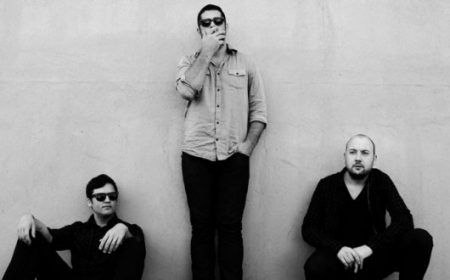It’s the night before ‘Rise Ye Sunken Ships‘ is released in the UK.
Moments before the headliners are due on stage. Night & Day is crammed wall to wall with people. There’s hardly room to raise a glass of beer. The word’s gone around: this is a band you must see live. We Are Augustines have toured this part of the world up and down and back and forth for the last 12 months in one form or another, and now they’ve returned to Manchester as a three-piece powerhouse.
They take to the stage, smiles on their faces and bottles in their hands. Billy McCarthy tips his beat-up fedora to Eric Sanderson and Rob Allen, and they begin the hearty business of tearing up the floorboards with ‘Rise Ye Sunken Ships’. We’re immediately struck by this band’s raw power of presence; they launch themselves into their music, raising up a godalmighty beatific racket you can hardly fail to be swept away with.
‘Ballad of a Patient Man’ follows in swift pursuit, a punkish roar of a song that doesn’t so much capture the imagination so much as it kidnaps it and smuggles it away to sea with a heartfelt story of the first hesitant steps of romance. ‘Juarez’ is another escape, fleeing to the badlands of Mexico from a family tearing itself to pieces.
By now, the sweat is all but pouring off them. They’re throwing themselves into it gladly, bouncing off the fixtures with the joy of it all. McCarthy says it himself: “This is a celebration!” Whether he means the record release tomorrow, or the brazen euphoria he and this band are generating in this tiny little club on a Sunday night, who the hell knows. ‘Headlong Into The Abyss’ is stirring Night & Day up into an ethereal frenzy of road trip anthems and starry-eyed keyboard loops. Sober analysis doesn’t come into it.

(Photo: Julia Stryj)
As if to validate that thought, McCarthy calls the next song, ‘Strange Days’, their very own “sea shanty”. Sure enough, for a song about overcoming depression, it swings its weight with the best of the timeless tub-shakers. “You got scars”, he sings, “but you got savings in your jar. It’s your time, it’s your turn, so board the train.”
Shanty sung and met with showers of applause, McCarthy raises a glass to the room, introducing us to Cameron the roadie. He credits Cameron as he credits the assembled fans: “Without you, this doesn’t happen. Thank you.” Sanderson flashes us a grateful smile: “We’ve played a lot of shows in our lives…nights like this are what make it all worth it.”
So, 45 minutes after we first met these men, what do we know? They’ve got the talent to come up clutching gold with those songs. They’ve got the stamina to rock any given venue from wall to beer-stained wall. They’re three musicians who love what they do and love the people who make what they do possible. You don’t just get the impression that We Are Augustines are going places. Somehow, you know they’ll be the same affable rock and roller gents by the time they get there.
Mere hours before they blew the roof off the building with their performance at Manchester’s Night & Day Café, Billy McCarthy, Eric Sanderson and Rob Allen sat in the touring van with Live4ever and talked over accidental inspiration, community spirit, their affinity with the UK and why Bruce Springsteen is the ultimate rock and roller…
Hi guys. How are you finding the UK?
Eric Sanderson: It’s luurvely.
Billy McCarthy: I hope I’m saying this right, but music means a lot to people in the UK. Like, people are willing to…just rock their music. I was out at a club the night before last, and this old Mod dude – did you see him? He was hitting on the girls, he had the neckerchief – wow. Dudes that are 48 don’t rock hairstyles like that, wear it on their sleeve like that in the States. Not with having a pot belly and raising lots of kids. Music means a lot over here, and that’s really nice for us.
What music is inspiring you at the moment?
BM: I know that we’re very big on the Charles Bradbury record that came out. He’s an old soul man that just made his debut record. 62 or 63 and it’s his first record. He’s done music with the Daptones in Brooklyn. It’s an amazing story. He was a cook in a diner, and he walked into a label and said “I heard you were looking for a singer.”
ES: Eh…I’m currently in a phase of not listening to other stuff. You go through phases. Sometimes I devour stuff, then months will pass when I’ll be processing our own music or working on something and I don’t really want to dive into other music. I know that’s not the funnest answer for your question (laughs).
It’s interesting – trying to isolate yourself from all other influences.
Rob Allen: It can be dangerous, you know? It can be dangerous to listen to stuff when you’re trying to be creative.
BM: It’s easy. We definitely had times over the years we’ve been playing where I’m like “Shit man, I don’t know where I came up with this!” Then we’ll be in the van listening to a CD, and then whoa – now I know where that came from.
ES: Sometimes it happens. One day I woke up and I recorded this song and I loved it, going to work, humming it in my head…and then about twelve o’clock I realised it was my friend’s song he’d shown me a week ago.
Rob – how did you come by this band? How did the two spheres meet?
RA: Simple. Pela’s drummer was a guy called Tom Zovich and I lived in the same building as Tom. We were good mates, very close. And for whatever reason he no longer could play and so he recommended me. It happened very quick. I remember Bill calling me up – I kinda knew, I was expecting it – and then we had a chat, met up a couple days later, played for a good few hours. I had a little storage facility where I’d put my drums and practice. It was probably the size of this van. So we would fit all our gear into this little room and for two weeks we had to cram a set. We had to learn the record, then we had to go rehearse for two weeks before we were in front of a thousand people at Heaven [the London venue, not the religious concept]. So it happened pretty quickly, then it’s been go go go ever since.
ES: I think we had a week off during Christmas, and that’s it.
All that touring seems to have paid off. You’ve generated a huge amount of buzz here in the UK, and the record’s not even out yet...
BM: It’s really funny, the UK thing, because I’ve been here, I travelled through here to get to Europe a couple times but we’d never really spent a lot of time. Eric and I, before we quit our jobs to do this, we were working for an English company. A shipping company. So our bosses were British, and then Tom’s like, “I know a drummer, he happens to be British.” Our manager’s British- what the hell happened?!
ES: In the previous band, we were never able to tour Europe, England, so we went from being isolated in the States for years, close to a decade, and now I think this is our seventh time that we’ve come to England within a year. I think we’ve played more in this part of the world than in the States.
BM: Band’s only been together 12 months.
ES: We’ve certainly played more shows than we’ve rehearsed. It’s not normal.
BM: You learn. A band that came out of Europe that was really interesting was The Strokes. I remember hearing stories – Eric and I used to be in their rehearsal building – they only had like, nine songs for their first record to play live. I don’t know if that’s true but supposedly, they had all the makings of a band except for the songs. We’ve just learned on the road, which is a really magical thing that really does make you better. One show is worth a week of practice. More than that, just seeing how this works, from the door guy to the promoter to the green room to the journalists, management, agents, visas…it’s a lot to learn.
RA: To think, when you listen to the performances we’ve done over the years and see where the improvements are – imagine how many rehearsals it would’ve taken to get to that point.
ES: Our first shows, we were sitting down. Our first tour, we were sitting down. We opened for the Boxer Rebellion, they took us out on two or three tours. I think we played four shows [sitting down]. But then we played Leeds, and the stage was so short, and it was sold out. We realised if we sat down, that no-one would be able to see us. So we stood up, and it’s evolved a lot since then.
BM: That was our first standing gig. Crazy. People are so funny, they compare you to whatever’s big at the moment, you know? People were comparing us to Mumford & Sons.
I can’t see that…
BM: Arcade Fire’s the new one. And I’m thinking, really? They’re like a fifty-piece Canadian band that wears vests and shit. How the hell does a three-piece from Henry Street in Brooklyn sound like that?
Journalists just like to throw in as many band names into an article as possible. I know I do.
ES: If you had to say we sound like somebody, who would you choose? Cos we need some new names.
 For me, first thing I hear is Bruce Springsteen.
For me, first thing I hear is Bruce Springsteen.
BM: Springsteen’s a funny topic, because I’m noticing a big influence in the UK, and America and if I can say so without being offensive, I find British radio to be generally a lot poppier. Catchier. We were listening to The Monkees the other day and that is catchy shit. I think the one X factor in American music, Americana, is country, this croony pedal steel blues music. I read an article Paul McCartney was writing about scales, Elizabethan scales. You guys are steeped in a different melodic scale – also our backdrop is very different. I can imagine Ian Curtis walking around that corner right now and ducking into an alleyway. I can see Joe Strummer smokin’ a cigarette, Shane McGowan gettin’ into a fistfight…I see it here. But put him in Gainsville, Florida? I don’t know if Orlando would produce a Joe Strummer.
ES: I think what were talking about earlier, country storytelling, that’s a very important part of our history. We certainly have jazz, which is primarily instrumental, but it’s based on a blues structure, and blues is nothing more than storytelling. Sending out an emotive response to life. A call and response to life. And I don’t see it as strongly in England.
BM: But think about The Beatles, adding harpischord. Fuck! Who’s doing that? Who would’ve done that in America? No-one, probably for a hundred years. Do we even have those in America? Some of the people in the Mount Rushmore of American music history, obviously Woody Guthrie or Leadbelly, these people played very simplistic musical styles, but it was about the war against fascism, or “I ain’t gonna work on Maggie’s Farm no more” or the Vietnam war. But you guys did punk rock better than anybody, that’s for sure. Sex Pistols was my first record. ‘Never Mind The Bollocks’.
RA: Don’t forget the New York Dolls. McLaren took the Dolls and he ripped them off.
BM: But he did it so well! I love that tug of war between the United Kingdom and the States, it’s like, “Oh really? Aerosmith? Well we have the fuckin’ Who.” “Yeah? We got Pearl Jam.” “Aaagh we have Radiohead!” I love that the UK fights way above their weight class, population-wise. The fact that you’re able to produce Queen, and stadium band after stadium band. Jesus, think of another country that can say that. But I love thinking about it. I love your Donovan and our Dylan.
There’s a mutual fascination, isn’t there?
BM: I was actually talking to an Irish guy last night in the pub, and he was saying “Ah, the Irish and the Americans, we have a kinship, right?” and I was watching this Billy Connolly interview and he was saying the English and the French don’t get along, but Scottish people and the French get along great, and I was thinking wow; the United States and England have such an interesting relationship and if I’m honest with you, the reviews have all been fantastic, I think that sometimes, with English people maybe it goes a little far with the heart on sleeve thing. But it’s the same in America.
‘Rise Ye Sunken Ships’ – what does that mean to you?
BM: I guess it’s for everyone now. Whatever they feel. I guess it just means, get up, you can do it. You got fight left in you, stand up, give it another shot.
Journalists love to read into things, so when they see a band called Augustines, they immediately think: ah, Patron Saint of Brewers.
BM: Eh, well, there’s no shortage of drink in our past. It’s definitely evened out into a manageable, humane consumption level. In our last band we didn’t hide the fact that we enjoyed drinking. On stage. I think it was really about being handcuffed by inept labels and a tangled up mess of business follies. If we could get ourselves on stage we were definitely gonna celebrate that. It wasn’t going to be by baking cookies.
ES: That was potentially one of the reasons that band didn’t make it.
Would you say the internet community had something to do with the success of this band?
BM: I think it was our community, to be honest. In the beginning stages, we had no money, we had a record that needed to be completed, we didn’t have a name, we didn’t have a website, we didn’t have shit. We had two crappy jobs and a dream. But I think what we did was wise and I strongly suggest it to any young upstart who wants to get going in the rock and roll business. The best criticism you’re gonna get, believe me, is from your friends. Start there. If you wanna see where you’re at, go to a safe, core group of friends and just get feedback. What we did was, we actually hatched a very clever plan, to include our community into our band, and say basically: “Without you, this doesn’t really work.” I think it was before even the beginning of Band Camp and Kickstarter. It was just something we came up with ourselves. We went on the radio and talked about our project, and what’s really cool about this band is that people remember when they saw us in England as a two-piece sitting down. And they remember the new guy, Rob. They remember the first article they read, and now they’ve seen us on TV it’s like, no matter how far we get into this as a profession, we still really feel that there are people around us that were there for us. Slashed their price in half to do a website, did photos for free, gave us 200 bucks to throw in the pot, and until very recently we returned every single email any fan ever wrote us. It’s starting to get pretty dense now, but it’s a reciprocal relationship and I think we’d like to keep it that way.
It seems to be working. People are opening up to the kind of music you guys are making.
BM: Isn’t that the directive of any artist, to make contact? Which is funny. To go back to Springsteen, there seems to be this profile in rock and roll, this sort of despondent, peacock-y rock and roller that wants to shag girls and sniff drugs and doesn’t want to grant interviews, can’t be bothered with this. And what’s really cool about Bruce Springsteen is hey, the guy’s 61 years old. He’s never been slapped with a paternity suit, he’s been good to his band, he’s put his bandmates’ kids through college by his songwriting. He’s set up health insurance for them, he’s never gotten fucked up on drugs, there’s no stories of him crashing cars in swimming pools. The dude loves music. And if that’s too heart on sleeve for anybody, then I guess maybe you like your rock and rollers in a peacock way. The guy just stands for no bullshit, like I play rock and roll. I want to play as much of it while I’m on this earth as possible. There’s a really cool thing he shouts to the crowd…what is it?
ES: “No-one wins unless everybody wins.”
BM: That’s cool, man. That’s very different than Lambourghinis, herpes…
ES: Motley Crüe…
BM: …Rehab…gold lamé fucking headbands and shit…
ES: There’s this beautiful Ghanian Denkyem symbol, it’s an alligator that has two heads and shares the same stomach. And it shows the same sentiment: we all share the same stomach, we all live together. If you take from somebody, you’re actually just taking from yourself.
We Are Augustines celebrated the release of ‘Rise Ye Sunken Ships’ with a launch party at the London Lexington on March 5th. They will precede a North American tour with Band Of Skulls with a series of shows at this year’s South By Southwest festival. Full details at weareaugustines.com





